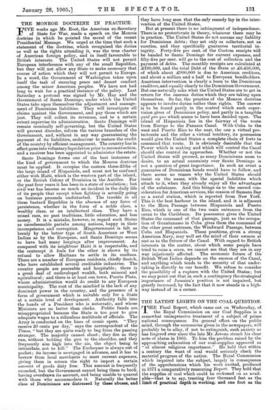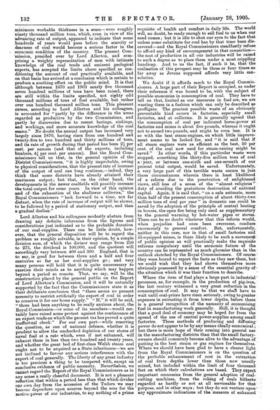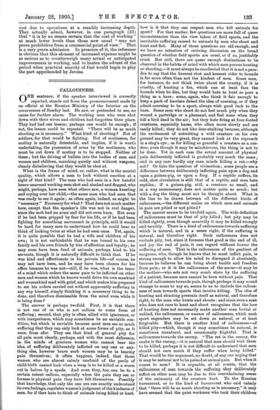minimum workable thickness in a seam—were roughly ninety thousand million ,
tons, which, even in view of .the advancing rate of output, appeared to indicate that some hundreds of years would pass before the scarcity or .dearness of coal would become a serious factor in the economic condition of the country. The present Com- *mission, presided over by Lord Allerton, and com- *sing a weighty representation of men with intimate knowledge of the coal trade and eminent geological experts, has accepted the limits above specified as con- ditioning the amount of coal practically available, and on that basis has arrived at a conclusion which is certain to produce a soothing effect on the public mind. It is that although between 1870 and 1903 nearly five thousand seven hundred millions of tons have been raised, there are still within the limits specified, not eighty odd thousand millions of tons of fuel available, but rather over one hundred thousand million tons. This pleasant excess, according to Lord Allerton and his colleagues, is accounted for "partly by the difference in the areas regarded as productive by the two Commissions, and partly . by discoveries due to recent borings, sinkings, and workings, and more accurate knowledge of the coal seams." No doubt the annual output has increased very largely since 1870, having risen from one hundred and twenty-five to two hundred and thirty millions of tons, and its rate of growth during that period has been 21 per cent. per annum (and that of the exports, including bkinkers, 41 per cent. per annum). But the Royal Com- missioners tell us that, in the general opinion of the District Commissioners, " it is highly improbable, owing to physical considerations, that the present rate of increase of the • output of coal can long continue,—indeed, they think that some districts have already attained their maximum output; but that, on the other hand, the developments in the newer coalfields will possibly increase the total output for some years. In view of this opinion and of- the exhaustion of the shallower collieries," the Royal Commissioners " look forward to a time, not far distant, when the rate of increase of output will be slower, to be followed by a period of stationary output, and then a' gradual decline."
Lord Allerton and his colleagues modestly abstain from drawing any definite inferences from the figures and considerations just indicated as to the probable duration of our coal-supplies. There can be little doubt, how- ever, that the general disposition will be to regard the problem as roughly solvable, in their opinion, by a simple division sum, of which the divisor may range from 250 to 275, the dividend is 100,000, and the quotient will accordingly vary between 400 and 360. England, that is to say, is good for between three and a half and four centuries so far as her coal-supplies go ; and very many persons will hold that it is quite unnecessary to exercise their minds as to anything which may happen beyond a period so remote. That, we say, will be the construction placed by the general public on the Report of Lord Allerton's Commission, and it will be naturally supported-by the fact that the Commissioners state it as their deliberate conclusion that " there seems no present necessity to restrict artificially the export of coal in order to conserve it for our home supply." " If," it will be said, " there had been anything to be really anxious about, the Royal Commission—or some of its members—would cer- tainly have raised some protest against the continuance of an export trade on which the present tax has proved a quite ineffectual check." For our own part—while reserving the question, as one of national defence, whether it is prudent to allow the unchecked depletion of our stores of naval fuel at a rate which, even it not enhanced, will exhaust them in less than two hundred and twenty years, and whether the great bed of first-class Welsh 'steam coal ought not to be acquired as a State inheritance=we are not inclined to favour any serious interference with the export of coal generally. The liberty of any great industry is too precious a thing to be tampered with, except on conclusive evidence of public necessity. Nevertheless, we cannot regard the Report of the Royal Commissioners as in any sense a really cheerful document. It is not a pleasant reflection that within a period less than that which divides our .own day from the accession of the Tudors we may become dependent upon sources beyond the seas for the motive-power of our industries, to say nothing of a prime requisite of health and comfort in daily life. The world will, no doubt, be ready enough to sell fuel to us when our need comes ; but it is idle to shut our eyes to the fact that unless some substitute for coal has by that time been dis- covered—and the Royal Commissioners steadfastly refuse to afford any kind of encouragement in that connection— the cost of production in all our industries will be raised to such a degree as to place them under a most crippling handicap. And to us the fact, if such it be, that the realisation of this prospect may be three or four times as far away as Jevons supposed affords very little eon-, solation.
We doubt if it affords much to the Royal Commis- sioners. A large part of their Report is occupied, as under their reference it was bound to be, with the subject of possible economies in consumption of coal. They have to tell us that, limited as our resources in fuel are, we are wasting them in a fashion which can only be described as profligate. The greatest possible waste of an obviously preventable kind occurs in factories, especially small factories, and at collieries. It is generally agreed that the consumption of coal per indicated horse-power at- factories and mines is about five pounds, whereas it ought not to exceed two pounds, and might be even less. It is so with the hest steam engines, on which little improve- ment seems to be looked ler, and " it is said that if all steam engines were as efficient as the best, 50 per cent. of the coal now used for steam-raising might be saved." In other words, if this particular waste were stopped, something like thirty-five million tons of coal- a I year, or between one-sixth and one-seventh of our present total output, would be saved. Unfortunately; a very large part of this terrible waste occurs in just those circumstances wherein there is least likelihood of a reform due to the penetration of enlightened views, still less of a sense of the " almost religious": duty of avoiding the gratuitous destruction of national capital. Again, it is said that., " on a safe estimate, more than half of the present consumption of about thirty-two million tons of coal per year " in domestic use could be saved by the adoption of the principle of central heating in houses, the open fire being only used as supplementary to the general warming by hot-water pipes or stoves. There can be no doubt whatever that this reform would; when prejudice had once been overcome, conduce enormously to general comfort. But, unfortunately, neither in this case, nor in that of small factories and ill-equipped mines, is there likely to be such a movement'` of public opinion as will practically make the requisite reforms compulsory until the economic future 'of the country can be represented as much gloomier than in' the outlook sketched by the Royal Commissioners. Of course'. they were bound to report the facts as they saw them, but., we could wish that they had shown themselves • more obviously possessed by a sense of the essential gravity of the situation which it was their function to describe.
Where the item of fuel plays a large part in industrial processes, as, for example, in the production of pig-iron, the last century witnessed a very great reduction in the' consumption of coal. It may be that we shall have to wait until coal-prices have risen seriously, owing to greater expenses in extracting it from lower depths, before there is a general recognition of the necessity of economising fuel in manufacturing work generally. Still, it is thought that a good deal of economy may be hoped for from the spread of the use of central power-supplies among small factories. These methods of producing and diffusing • power do not appear to be by any means ideally economical ; but there is more hope of their coming into general use in the manufacturing districts than that the small factory- owners should commonly become alive to the advantage of putting in the best steam or gas engines for themselves. Where we should have been glad to have a clearer light from the Royal Commissioners is on the question of the probable enhancement of cost in the extraction of coal from depths lower than those now usually mined, but included within. the limit of four thousand feet on which -their calculations are based. They expect important economies from •the general adoption of coal- cutting machines, from the coking of coals hitherto regarded as hardly or not at all serviceable' for that purpose, and in' other ways; but they do not venture upon' any approximate indications of the measure of enhanced
cost due to operations at a steadily increasing depth. They actually admit, however, in one paragraph (23) that " it is by no means certain that the cost of working " at much lower levels than those now usual " may not prove prohibitive from a commercial point of view." That is a very grave admission. In presence of it, the inference is obvious that this element of increased expense might be so serious as to counterweigh many actual or anticipated improvements in working, and to hasten the advent of the period when practical scarcity of fuel would begin to play the part apprehended by Jevons.
























































 Previous page
Previous page